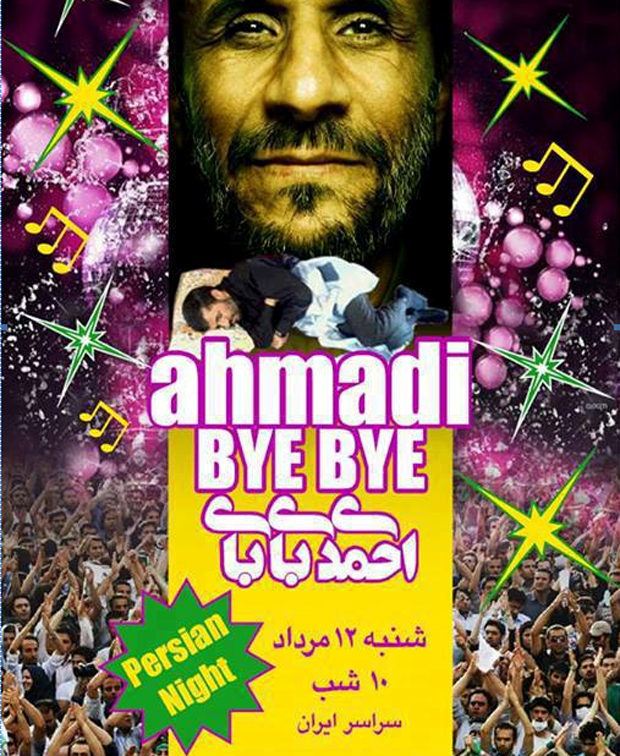5 Aug 2013 | Iran, News and features

Iranians stormed the streets in celebration when his victory was announced, and this giddy optimism also permeated social media.
In the days after the election, there was an opening up of the national media, which has been steadily strangled over the past 8 years, as reporters and journalists tested the new waters to measure where the new limits of censorship have been set.
On July 23 the Iranian Students’ News Association announced Rouhani’s government may lift the filter from Facebook and other social networks, but after going viral, the article was deleted without explanation.
Iranians on social networks have started a campaign called “Rouhani, Mochakerim” [Rouhani, Thank You], a platform on which they seem to thank the new president for everything good in their everyday lives. One said, “I think Facebook needs to have a ‘Thank You Rouhani’ button” for Iranians”. Another quipped, “My phone’s had more battery life since Rouhani won the elections. Thanks Rouhani!”
Blogger Younes is very optimistic about Rouhani and hopes Iran’s relationship with other countries will be improved over the next four years. Younes described how Ahmadinejad’s foreign policies united the world against Iran. He pointed out that the invitations to Rouhani’s inauguration were sent to world leaders signalling that Iran is ready to change its position and open up dialogue with the outside.
Optimists aside, there are also those who are unsure whether Rouhani will be able to keep his promises. Twitter user thebrightriver has criticised Rouhani for the ministries he has proposed to the Parliament: “Rouhani has promised that he will create the Ministry for Women, but he hasn’t even chosen one woman as a minister! It’s good I didn’t vote otherwise I’d owe one to my conscience”.
Mohammad Hosseini Nejad argues Rouhani is not a magician, that radicalism is the biggest threat to his ability to fulfil his promises, and that his policies will only be implemented if all of the opposition factions join together to support him.
Rouhani’s victory has also created space for Iranians to publicly satirise Ahmadinejad. On Friday, Iranian Twitter users ridiculed Ahmadinejad’s government using the #AhmadiByeBye hashtag, and sent an invitation to social media users to attend Ahmadinejad’s Goodbye Party on Saturday, 3 August 2013.

Farzad said, “Ahmadinejad has claimed that he fought economic corruption, but everyone connected with him was involved in the biggest embezzlement in Iran’s history. #AhmadiByeBye” Hooman agreed, “These 8 years have shown me how just one mistake can destroy life of an entire generation. #AhmadiByeBye”.
While the atmosphere, at least on social media, is one of optimism, Rouhani’s road ahead is tough. For the next four years he will battle against the supreme leader and the Parliament to implement some of his more ambitious promises. Despite being a figurehead for Iran when it comes to the country’s public relations, the president has relatively limited power and will struggle to liberalise the country.
This article was reported by Bronwen Robertson and Amin Sabeti of Small Media. Small Media has collaborated with the Munk School on launching ‘Rouhani Meter’, where Rouhani’s policies will be tracked across the first 100 days of his candidacy and beyond.
1 Aug 2013 | News and features, Pacific Standard, Russia

Russian lawmaker Vitaly Milonov has suggested that every gay athlete and spectator who comes to Russia for the 2014 Games will be arrested. (The International Olympic Committee says that won’t happen.) And while it is not totally clear what the “gay propaganda” law specifically means, Global Post has a useful summary:
Reports of arrest for kissing or hold hands, wearing or using rainbows, or pro-gay activism have helped to clarify the definition of “propaganda” as “any statement, oral or otherwise, that is pro-gay.”
It is now illegal to even admit homosexuality in public. It is also illegal to equate the value of homosexual relationships with that of heterosexual relationships, and punishment does not apply solely to Russians.
Foreigners can be arrested and detained for up to 15 days, fined and deported.
So, basically, anything remotely gay, and you’re in prison. With that in mind, I suggest, to Milonov and the rest of Russia, that every sport be banned from the 2014 Winter Games.
Alpine skiing? The competitors wear rainbow-colored spandex, which is often associated with “gay” in popular culture.
Biathlon? Men. Holding guns. Discharging them into the air. Textbook phallic symbolism.
Bobsled? Four men in spandex, stuffed inside a penis-shaped capsule. You could also argue that women doing the same—being inside of the penis capsule, which is an anti-traditional-sex position—is just as evocative of disruption.
Cross-country skiing? See alpine skiing.
Curling? Women eschew traditional feminine attire for pants and polo shirts. Men crash large stones into large stones strategically placed by other men.
Figure skating? “I can say that the best figure-skating in the world is the Soviet school of figure skating,” said Milonov. I have no response.
Freestyle skiing? Women with sticks strapped to their feet stomp over moguls, which evoke breasts, and thus suggests a rejection of classical femininity.
Ice hockey? Wood-en sticks are used to slap a hard and cold object past a desexualized being covered in padding and shielded by a mask.
Luge? Men in spandex, laying backwards, in direct contrast with the traditional male posture of dominance. Women, erect and sliding through a giant tube, subverting the basic male-to-female sex act.
Nordic combined? One gay sport plus another gay sport equals a really gay sport.
Short track speed skating? Often results in members of the same sex piled on top of each other while wearing extremely tight clothing, and is therefore not too dissimilar from a public orgy.
Skeleton? The name itself is a rejection of the appearance and the living human characteristics which are the basis of traditional patriarchal society. That, therefore, is an inherently gay attitude.
Ski jumping? Both male and female posit themselves as human phallic symbols, hurtling through the air. That evocation of equality is gay.
Snowboarding? The sport was founded as a counter-cultural activity, which is gay.
Speed skating? Hooded spandex outfits obscure any suggestion of gender across all competitions, thus creating a space for any/all close readings of sexuality, which would not be the case in a climate where “gay” is considered illegal.
In short, ban the 2014 Winter Olympics from Russia.
This article originally appeared at Pacific Standard. Pacific Standard is an arm of the nonprofit Miller-McCune Center for Research, Media and Public Policy.
15 Jul 2013 | Burma
Fifty years of authoritarian rule has left its mark on Burmese society affecting the speed and process of transition.
This chapter will explore the political landscape and its potential effect on freedom of expression, the current impact of the government, constitution and judiciary on freedom of expression. Following this the chapter will explore how the ongoing ethnic conflict has impacted upon free speech and how recent developments in the right to freedom of association have affected the ability to protest in Burma.
It is unclear whether the transition to a functioning democracy based on the rule of law and human rights will be completed, or whether the transition will remain incomplete: this will have the largest impact on freedom of expression in Burma in the near-future.
(more…)



